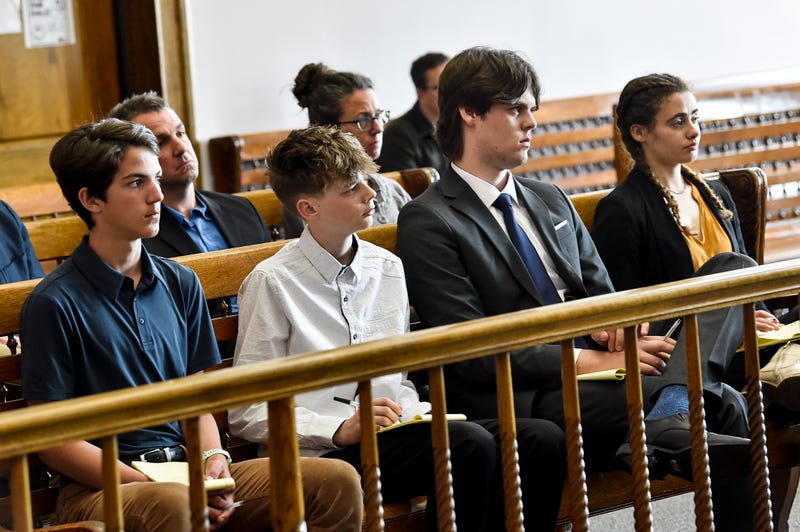
BILLINGS, Mont. (AP) — Young climate activists and their attorneys who won a landmark global warming trial against the state of Montana are trying to convince a federal judge to block President Donald Trump’s executive orders promoting fossil fuels.
During a two-day hearing starting Tuesday in Missoula, Montana, the activists and their experts plan to describe Trump’s actions to boost drilling and mining and discourage renewable energy as a growing danger to children and the planet. They say the Republican's stoking of global warming violates their constitutional rights.
A victory for the activists would have far broader implications than their 2023 win, where a state court faulted officials for permitting oil, gas and coal projects without regard for global warming.
But legal experts say the young activists and their lawyers from the environmental group Our Children’s Trust face longer odds in federal court. The Montana case hinged on a provision in the state constitution declaring people have a “right to a clean and healthful environment.” That language is absent from the U.S. Constitution.
"Federal law doesn't really offer anything to really work with for these groups," said David Dana, a professor at Northwestern University Law School in Chicago.
Attorneys for the U.S. Department of Justice and 19 states plus Guam want Judge Dana Christensen to dismiss the case.
A previous federal climate lawsuit in Oregon from Our Children's Trust went on for a decade and ended in a denial this year from the U.S. Supreme Court.
Our Children's Trust attorney Andrea Rodgers said the Constitution contains protections for life and liberty that cannot be ignored.
“We’re asking the Court to apply traditional laws with respect to what constitutes the right to life and the right for liberty,” Rodgers said.
White House spokesperson Taylor Rogers said Trump had ended the preferential treatment given to some sectors of the energy industry under his predecessor.
“President Trump declared an energy emergency on day one in the best interest of the American people to protect our economic and national security. He will continue to unleash American energy,” Rogers said in an email.
The 22 plaintiffs include youths and young adults from Montana and several other states.
A 19-year-old from California plans to testify to Christensen about the harms of wildfire smoke. A 17-year-old from Montana is slated to speak about Trump frustrating her attempts to get electric buses for her school. And a 20-year-old Oregon woman going to school in Florida will talk about how Trump’s plans could result in worse hurricanes and wildfires.
"No matter where I live, I cannot escape extreme climate events resulting from fossil fuel pollution,” Avery McRae, the student from Oregon, said in a court declaration.
It’s a similar playbook as the 2023 trial: Young plaintiffs spent days describing how worsening fires foul the air they breathe, while drought and decreased snowpack deplete rivers that sustain farming, fish, wildlife and recreation.
Another legal win by Our Children's Trust also came out of state court. Children and teens in Hawaii last year reached a historic settlement that included a requirement to decarbonize the state’s transportation system over the next 21 years.
Only a few other states, including Illinois, Pennsylvania, Massachusetts and New York, have environmental protections enshrined in their constitutions.
Carbon dioxide, which is released when fossil fuels are burned, traps heat in the atmosphere and is largely responsible for the warming of the climate.
Amanda Braynack, communications director for Montana Attorney General Austin Knudsen, said the states were trying to prevent the litigants from “destroying our country's energy security.”
Attorneys for the federal government and states are expected to deliver arguments but not call any witnesses.
Even if the activists lose, it could draw attention to Trump's perceived failures to act against climate change, said Jonathan Adler, a climate law expert at William and Mary Law School in Virginia.
“These cases have always been about not just what occurs in the court of law, but also in the court of public opinion,” Adler said.
Montana's Supreme Court last year upheld the 2023 trial outcome, which required officials to more closely analyze climate-warming emissions. To date that's yielded few meaningful changes in a state dominated by Republicans.
Montana utility regulators this month turned down a petition from environmentalists who wanted climate change considertions to play a bigger role in state Public Service Commission decisions.
Gov. Greg Gianforte told The Associated Press Montana needs more electricity including from fossil fuels.
“We have an obligation to our constitution and just morally to protect the environment, he said. ”But I don’t think that’s inconsistent with electricity production, and we need to be using fossil fuels coal, gas, oil, hydro, wind and potentially nuclear.”